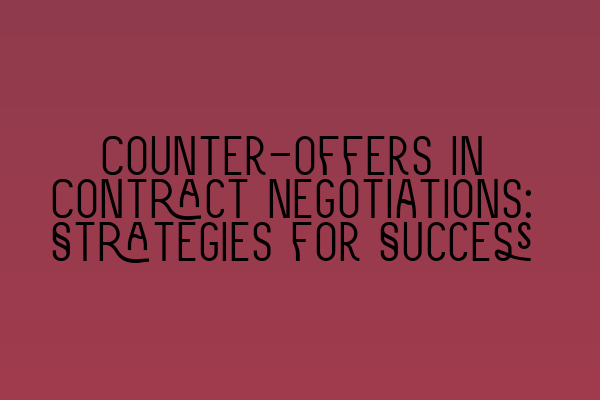Contract Negotiations: Strategies for Success with Counter-Offers
When it comes to contract negotiations, the art of counter-offers plays a crucial role in achieving favorable outcomes. A counter-offer serves as a response to an initial offer made by one party, signaling a willingness to engage in further discussion with the intention of reaching a mutually beneficial agreement. In this blog post, we will explore various strategies for success in handling counter-offers effectively. As an experienced solicitor at SQE Contract Law, I have witnessed the impact that strategic counter-offers can have on contract negotiations. Read on to discover the key principles and techniques to employ during this critical stage.
Understanding the Purpose of Counter-Offers
Before delving into the strategies, it is essential to comprehend the significance of counter-offers. When parties engage in negotiations, it is rare for the initial offer to align perfectly with their respective goals and interests. Counter-offers bridge this gap by allowing both parties an opportunity to express their preferences and explore alternative solutions. This process of back-and-forth dialogue not only facilitates a nuanced understanding of each party’s needs but also paves the way for creative problem-solving and compromise.
Strategic Approach to Counter-Offers
1. Gather All Relevant Information: Before formulating a counter-offer, it is paramount to gather all pertinent information about the current market conditions, industry trends, and the opposing party’s position. This knowledge equips you with valuable insights and strengthens your negotiation position.
2. Identify Your Objectives: Clearly define and prioritize your objectives and desired outcomes. This clarity enables you to negotiate effectively and prevents dilution of your core interests during the counter-offer process.
3. Analyze the Initial Offer: Carefully analyze the terms of the initial offer to identify areas of convergence and divergence. This analysis helps highlight potential areas for negotiation and determines which issues warrant counter-proposals.
4. Respond with Reasoning: Craft your counter-offer using clear and concise language, backed by well-reasoned arguments. By clearly articulating your rationale, you enhance the persuasive power of your counter-proposal, potentially garnering more favorable terms.
5. Focus on Interests, not Positions: One of the most effective strategies is to shift the negotiation focus from positional bargaining to identifying and addressing underlying interests. Understanding the motivations and needs of the other party helps in exploring mutually beneficial solutions.
6. Consider Multiple Scenarios: Prepare multiple counter-offer scenarios, each with its variations, to account for potential concessions and avoid getting locked into a single proposal. This versatility offers flexibility during the negotiation process, increasing the likelihood of reaching a satisfactory agreement.
7. Leverage Time: Time can be a valuable asset during contract negotiations. Employing time constraints to your advantage can create a sense of urgency and encourage the opposing party to consider your counter-offer seriously.
8. Collaborative Problem-Solving: Foster a collaborative negotiation environment by focusing on problem-solving rather than adversarial tactics. By engaging in constructive dialogue, you can create an atmosphere conducive to the discovery of win-win solutions.
9. Seek Legal Advice: Consulting a solicitor experienced in contract law can prove invaluable during counter-offers and negotiations. Their expertise will ensure that your interests are protected, legal requirements are met, and any potential risks are identified.
10. Know Your BATNA: Understanding your Best Alternative to a Negotiated Agreement (BATNA) empowers you to make informed decisions during counter-offers. This knowledge allows you to assess the value and viability of different negotiation outcomes.
Conclusion
Mastering the art of counter-offers is crucial for success in contract negotiations. By following a strategic approach, understanding the interests of all parties involved, and employing effective communication techniques, you can maximize the chances of reaching a favorable agreement. Keep in mind that each negotiation is unique, so adaptability, creativity, and collaboration are essential qualities to foster during the process. Remember, the goal is not simply to win but to create a mutually beneficial agreement that satisfies both parties’ goals.
